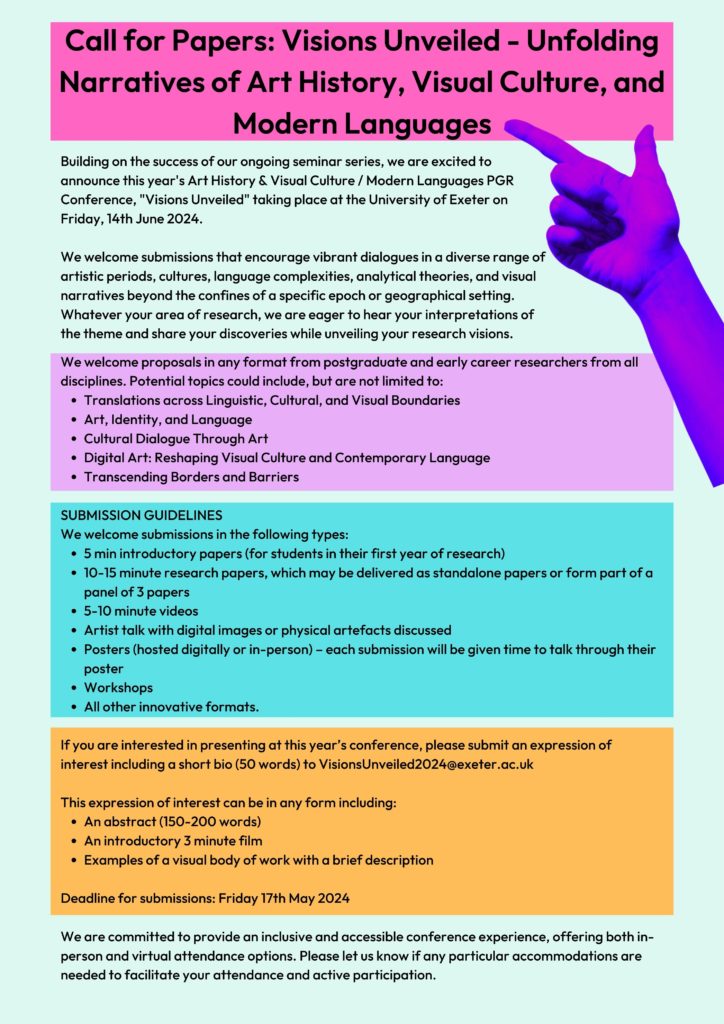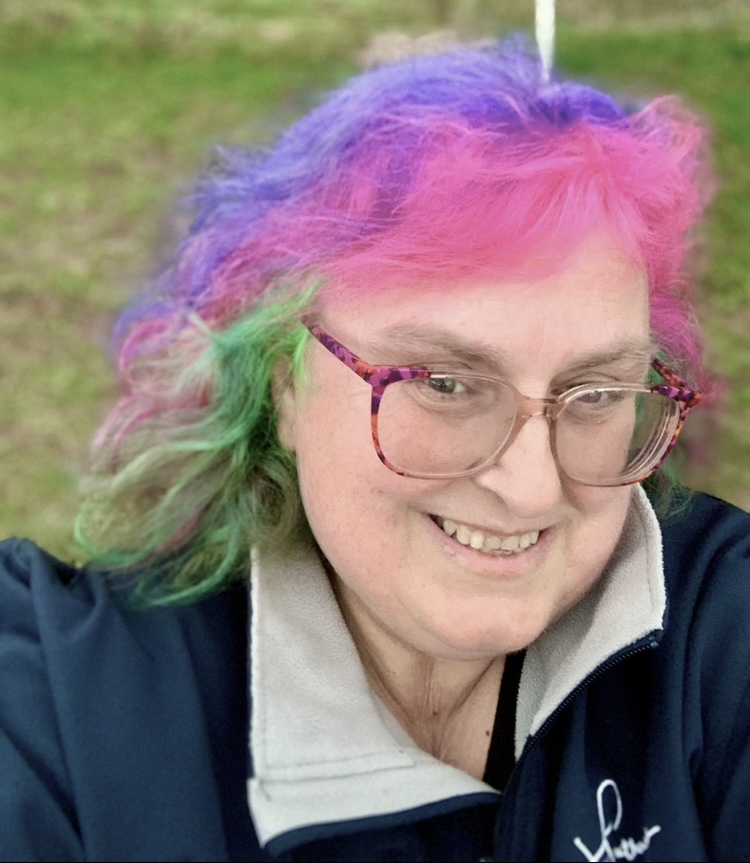Planning an academic conference is no walk in the park! Being one of the three volunteer committee members for the upcoming AHVC/ML PGR conference “Visions Unveiled: Unfolding Narratives of Art History, Visual Culture, and Modern Languages,” set for June 14th, 2024, I can vouch for the myriad of tasks, contagious excitement, and the anticipation that comes with it.
Imagine this: 33 speakers divided into parallel panels and a keynote speaker flying in from the USA. This event is set to be a lively platform for sharing ideas and giving a voice to budding scholars. Here, I share my experience and some tips for future organisers to help make your academic conference a success!
Crafting the Perfect Call for Papers (CfP)

Any successful conference starts with a rock-solid Call for Papers (CfP). The goal is to create a captivating narrative that matches your conference’s theme and attracts a diverse mix of scholars. For “Visions Unveiled,” we sought submissions that sparked dynamic dialogues across various artistic periods, cultures, languages, analytical theories, and visual narratives from beyond specific epochs or geographies. We wanted to hear interdisciplinary interpretations from other PGRs and ECRs.
Tips for an effective CfP:
- Clear and Concise Guidelines: Ensure the guidelines for submissions are straightforward, including word limits, formats, and deadlines.
- Inclusive Language: Welcome contributions from diverse academic backgrounds in various formats, such as artist talks, videos, lightning talks, and performances.
- Eye-catching Design: Make sure your CfP stands out visually to grab attention.
Spreading the Word
Once your CfP is ready, it’s time to get it out there! We shared our CfP on various Call for Paper websites and conducted email drops to other doctoral colleges, reaching a global audience. Plus, we harnessed the power of the social media platform X (formerly Twitter) to quickly connect with scholars and academic groups sharing similar interests.
Tips for disseminating the CfP:
- CfP Websites: Use platforms like call4paper.com, ArtHist.net, linguistlist.org, and forarthistory.org.uk.
- Social Media: Run campaigns on X with relevant hashtags and tagging.
- Email Campaigns: Create targeted emails for doctoral colleges and academic groups.
Funding
Funding is crucial for a successful conference. We were allocated a budget from the LCVS department and also applied for additional funds to bring in a keynote speaker from the USA. This required a clear explanation of what we wanted to fund, how it would enhance the PGR research culture, and the amount we were applying for. Thankfully, our application for additional funding was successful!
Funding tips:
- Detailed Budget: Provide a clear, itemised budget showing how funds will be used.
- Highlight Benefits: Emphasise how the conference will benefit PGR research culture.
Timetabling and Venue Logistics
Given the overwhelming response to our CfP, we received 34 submissions (one later withdrew), necessitating careful coordination of 33 speakers. We opted for parallel panels and booked two adjacent rooms to accommodate everyone comfortably. My advice? Book multiple rooms early to ensure they’re next to each other, avoiding last-minute seating issues.
Timetabling tips:
- Parallel Panels: Group similar topics into thematic sessions.
- Panel Size: Limit panels to four speakers plus Q&A time to keep the audience engaged.
- Time Management: Allocate enough time for presentations, Q&A, and breaks.
- Early Room Booking: Secure multiple rooms well in advance.
Nailing the Organisational Details
Meticulous organisation is key to managing a multifaceted event. From early planning to the actual conference day, every detail is crucial. We set up a shared, dedicated email for all conference-related communications to keep everything streamlined and cohesive.
Organisational tips:
- Shared Email: Use a dedicated email for all conference communications.
- Shared Spreadsheets: Track submissions and email responses in shared spreadsheets.
- Regular Meetings: Hold frequent committee meetings to discuss progress and troubleshoot issues.
- Regular Communication: Create a WhatsApp group specifically for the conference team. This will enable quick and efficient communication and prompt responses to any issues or questions that arise.
- Delegate Tasks: Divide responsibilities based on each member’s strengths.
- Consistent Branding: Produce a consistent brand and style for all documentation that is published about the conference.
The Power of a Great Team
One of the most important ingredients in this complex recipe is having an exceptional team by your side. I was extremely blessed to be working with two amazing teammates. The collaborative spirit and mutual support within our committee have been invaluable. Each member brought unique skills and perspectives, fostering a creative and productive environment. When you’re surrounded by passionate, dedicated people who share a common goal, it makes the entire process not only manageable but also incredibly enjoyable. Working together, we’ve navigated challenges, celebrated successes, and built a stronger, more cohesive event.
Collaboration with Department Leads
A crucial part of our success has been working closely with department leads for PGR research (in our case the director and assistant director of postgraduate research). Keeping them in the loop with regular updates has been invaluable. We scheduled meetings as needed to discuss our progress, share insights, and seek their advice. This collaboration has ensured we received much-needed support when faced with challenges. Their guidance and support have been beneficial to the smooth planning of the conference.
Final Thoughts
Organising “Visions Unveiled” has been incredibly rewarding. It’s given me a chance to hone valuable skills in event planning, communication, and teamwork. Future organisers should remember that patience and flexibility are just as important as meticulous planning and coordination. Every challenge is a learning opportunity, hopefully culminating in a successful conference that makes a real impact.
In summary, organising a conference is hard work, but the personal and academic rewards are immense. With a compelling CfP, strategic dissemination, solid funding, careful timetabling, and precise organisation, you too can create an unforgettable and successful conference. I’m eagerly looking forward to June 14th 2024, and the exciting narratives that will unfold at “Visions Unveiled.”
Thanks
I am deeply grateful to everyone who has contributed to the planning of the conference. A special thank you to my amazing fellow committee members, Katy Humberstone and Dave Weller, for their unwavering support and hard work throughout the process.
I also sincerely thank the department leads for their valuable guidance through the process. Thank you to Dr. Eliana Maestri, Director of Postgraduate Research, Languages, Cultures, and Visual Studies, and Dr. Yue Zhuang, Deputy Director of Postgraduate Research, Art History and Visual Culture.
Lastly, a big thank you to all the conference participants. Their enthusiastic submissions have been crucial in making the conference programme so exciting.
Information about the conference can be found at: https://sites.exeter.ac.uk/hasspgrblog/2024/05/24/visions-unveiled/

Jo, a part-time distance PhD student from the Forest of Dean, explores how selfies impact identity creation on social media and the narrative techniques artists use to craft their identities. With a background in professional photography, her research builds on her MA project “Fractured Identities.” She also coordinates the PGR Study Space group at Exeter University, fostering a collaborative environment for postgraduate researchers’ advancement.
